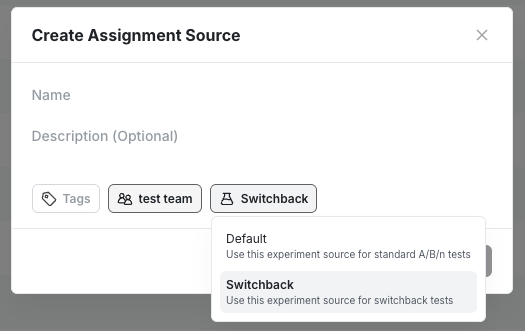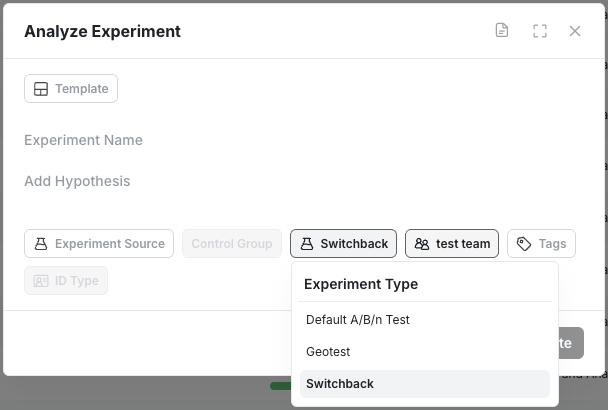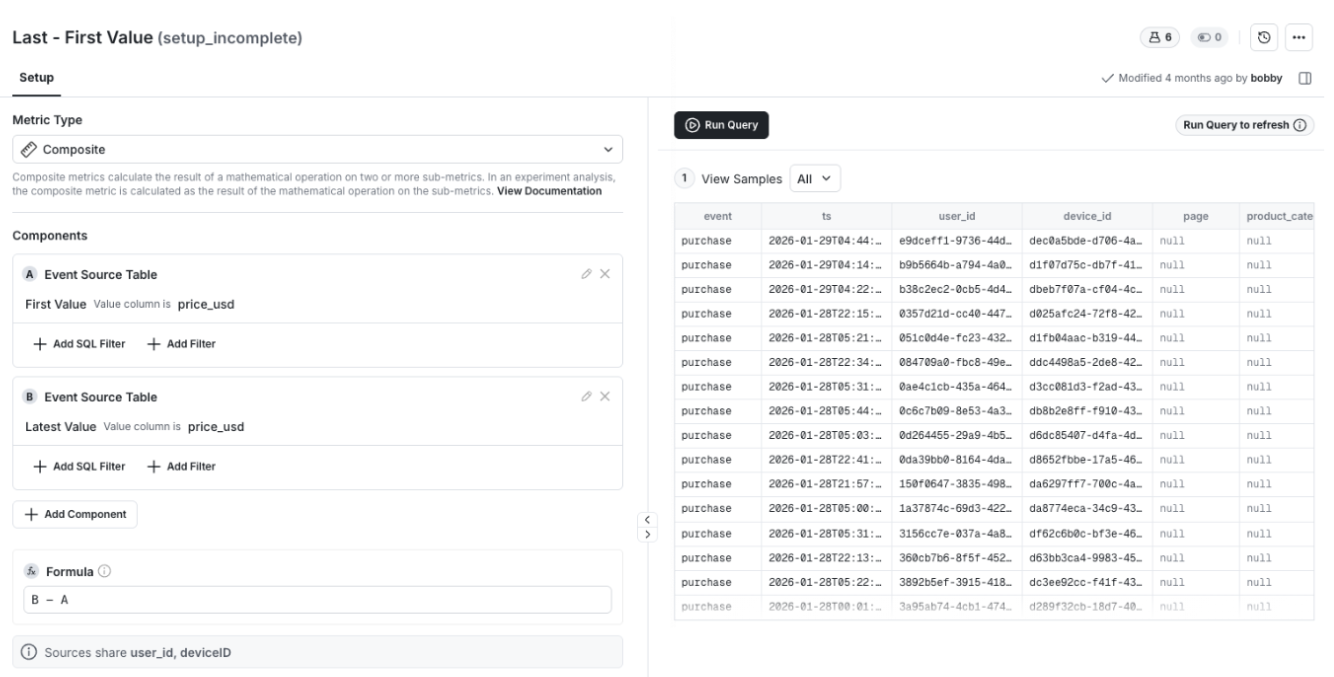Product Updates
Jan 2026
Dec 2025
- 🚀 AI-Powered Experiment Summary
- 🕵️ AI Knowledge Bank Search [Beta]
- ✏️ Contextual AI Descriptions
- 🧹 AI Stale Gate Cleanup
- ⭐ Github AI Integration
- 🧭 Warehouse Explorer
- 🧩 Segment Filters on Dashboards
- 🔎 Global Filters in Funnels
- 📊 Session Analytics on Warehouse Native
- 🔐 OAuth Support for Statsig MCP Server
- 🕵 Traces Explorer
Nov 2025
Oct 2025
- 🪵 Console Logs in Session Replay + Activity Pane Revamp
- 🧮 Sum Property Values at Funnel Conversion
- 💪 Power Analysis Enhancements
- ⏰ Schedule Experiment Start
- 🔎 Warehouse Events
- 🚪Feature Gate Exposures in Metrics Explorer
- 👨⚕️ Docs v2
- 📈 Autocapture Updates
- 📝 Statsig Visual Editor
- 💰 Rich Text Widgets on Dashboards
Sep 2025
- 📈 Change Alerts
- 🧪 Exposure Imbalance / Sample Ratio Mismatch (SRM) Debugging in Metrics Explorer
- ✍️ Custom Chart Annotations in Drilldown
- 🔍 Conversion Drivers in Funnels on WHN
- 🚢 Custom Experiment Decision Framework
- ✅ Personal Console API Key
- 🎶 API Endpoints for archiving and unarchiving Dynamic Configs
- 🧪 Sampling Across All Charts
Aug 2025
Jul 2025
Jun 2025
- 🧪 Experiment Exposure Events Metrics Explorer
- 🎯 Conditional Recording Triggers for Session Replay
- 🔄 Automatic Dashboard Refreshes
- 👁️🗨️ Chart Annotations
- 🕵️♂️ Log Explorer
- 📉 Fieller Interval
- 🧙🏻♂️ AI Onboarding Wizard
- 📊 Data Table View in Metric Drilldown
- 🛫 Pulumi Statsig Provider
- 🌩️ Statsig MCP Server
- 🪨 Geotest Experiments
- 📸 Results Snapshot
May 2025
- 📈 Delta Comparison View for Time Series
- 🧑🏼🏭 Braze Integration
- 🧮 Unique Values Aggregation
- 🚢 Experiment Decision Framework
- 📝 Setup Page's New Layout
- 🗂️ Multiple Group-Bys in Funnels
- 📐 Format Y-Axis Units in Time Series Charts
- 📋 Copy Experiment Metrics
- 🕒 Compute Scheduling
- 📊 Experiment Histograms
- 🖥️ Warehouse & Compute Mappings
Apr 2025
- 🚨 Topline Alerts Enhancements
- 🔮 Surrogate Metrics
- 📊 Compare more Groups in Funnels
- 🍩 Donut Chart & World Map 🌍
- 📊 New Aggregation: Count per User
- ⚙️ New Chart Options in Metrics Explorer
- 🎯 Cohort Filters on Dashboards
- 🧭 User Journeys on Warehouse Native
- ✋ Holdout Analysis in Product Analytics
- 💉 CURE (CUPED vNext)
- 📜 Helm Charts for Forward Proxy
Mar 2025
Feb 2025
Jan 2025
- 🐍 Python Server Core
- ⚙️ Custom Metrics in Funnels
- 📊 Distribution Charts++
- 👤 User Profiles
- 💾 Results in your Warehouse
- 🕵Differential Impact Detection
- ☕️ Java Server Core
- ⚔️ Interaction Detection
- ⚙️ Improved Console Settings
- Slicing by frequently used user properties
- Debug Data Ingestion Errors
- 👥 Filtering by User Dimensions in Custom Metrics
Dec 2024
Nov 2024
Oct 2024
- 📋 Dynamic Configs Now Have Templates!
- 🎉 SCIM User Provisioning
- ⏱️WHN Compute Transparency
- 🔍 Focused Analysis with Top Group Limits
- 🥇 First-Value metrics
- ⚡Inline Power Analysis
- 🪵🪄 Log transforms
- ⌚💰📊 Latest value metrics
- 🧲 Group-by in Retention Analysis
- 👯 Cohort analysis in all charts types
- 🪜Funnels Now Support Up to 15 Steps
- ⏱️ 2x Funnel Performance Improvements
- 📊 Cohort Analysis in Funnels
- 🔗 Improved Segment Integration
- 💥 Cross-Environment Feature Gates View
- 🚫 Metrics Update: Deprecating event_dau metric
Sep 2024
Aug 2024
- 🎛️ Dashboard Filters
- 🧠 Experiment Knowledge Base
- 🎓 Meta Analysis : August Release
- 📧 Dashboard PDF Export
- 🚀❤️📊 Statsig <3 Funnels
- 📅 Expanded Chart Granularities and MAU support
- ✨🛤️✨User Journeys Overhaul
- 🧲 Retention Overhaul
- 🕒 Session Analytics Private Beta
- 📋 Custom Experiment Checklist
- 📈 WHN Product Analytics
- 🤳 Parameter Stores
- 🤖 Bot Filtering
Jul 2024
- 📊 Benjamini-Hochberg
- 🌊 Session Streams
- 🔍 First-Time Filters in Funnels
- 🔗 Combine Events in Funnel Steps
- ⌨️ Keyboard Navigation
- 💾 Reusable Cohorts
- 📊 Outlier Detection
- 🧢 Capped Metrics (WHN)
- 🕵 Differential Impact Detection
- 💄 New look and feel on Statsig
- 👩💻 Statsig Managed API Proxy
- 🏠 New Home Experience
- 🧮 Improved Formula Support
- 🙋♀️ User Management v2
- 🎓 Meta Analysis : July release
Jun 2024
🎚️ Analyze Only Switchback in Beta
WHN customers can now provide their own Switchback assignment data for a regression based analysis in Statsig. This allows users to have maximum flexibility by controlling their own assignment method while leveraging already existing metric data in Statsig.
To get started you will need to first create a dedicated assignment source for Switchback experiments.

And select Switchback as an Experiment type in the Analyze Only experiment creation modal.

The feature is available today in beta. If you’re interested in learning more or need help getting started please reach out to us via Slack or through your account manager!
📓 Composite Metrics
WHN users can now create Composite Metrics in Statsig. Composite Metrics let you define a single metric as the sum or difference of multiple value aggregations.

Use to:
Measure net impact (for example, gains minus losses)
Compare the differences between values (last/first or max/min)
For added flexibility, you can break out components of a composite metric in your experiment results.

The feature is available today. Visit the docs page to learn more.
🔐 Clear, Flexible Privacy for Session Replay
Overview
We introduced a clearer, more flexible set of privacy controls for Session Replay. You can choose a baseline privacy configuration and refine it with element-level rules. This makes it easier to align replay collection with your organization’s privacy requirements while preserving useful context for analysis.
What You Can Do Now
Select one of three baseline privacy options that define how text and inputs are handled by default.
Apply CSS selector rules to mask, unmask, or fully block specific elements.
Manage all replay privacy settings from a single place in the console.
How It Works
You begin by choosing a baseline privacy option in the Statsig Console UI. This sets the default masking behavior for all session replays.
Baseline privacy options:
Passwords (Default): Only password inputs are replaced with asterisks (*). All other text and inputs are shown as is.
Inputs: All text inside input fields is replaced with asterisks (*). All other text is shown as is.
Maximum: All text and all inputs are replaced with asterisks (*).
After selecting a baseline, you can add CSS selector rules to override it for specific elements. Selector rules follow a strict precedence order: Block, then Mask, then Unmask. Password inputs are always masked and cannot be unmasked.
Blocking removes an element entirely from the replay and replaces it with a black placeholder of the same size. Masking replaces text with asterisks. Unmasking reveals text that would otherwise be masked by the baseline setting.
All settings are configured in the Statsig Console under Project Settings → Analytics & Session Replay and require project admin permissions.
Impact on Your Analysis
These controls let you confidently use Session Replay in privacy-sensitive environments. You can protect PII by default while selectively revealing safe UI elements for debugging, without sacrificing visibility into user behavior.
⏱️ Background Queries in Metrics Explorer
Longer-running queries no longer block your workflow. Metrics Explorer now supports background queries, giving you a dedicated experience for queries that take longer to complete.
What You Can Do Now
Kick off queries that continue running even after you close the tab or switch tasks.
Avoid timeouts for complex or large queries.
Track queries that are still running from a central, visible place.
How It Works
When Metrics Explorer detects that a query will exceed typical execution time, it automatically runs it in the background. You are free to navigate away or close the browser without interrupting execution. In-progress background queries appear in Metrics Explorer under the breadcrumb menu at the top, where their status is clearly labeled.
Impact on Your Analysis
You can confidently run heavier queries without worrying about timeouts or keeping a tab open. This makes it easier to explore larger datasets, iterate on complex funnels, and parallelize analysis with other work.
📏 Count Distinct Metric in Cloud
We’re excited to announce the Count Distinct metric type for Statsig Cloud. Count Distinct lets you measure unique entities—like transactions, devices, or pages views—by counting unique values across the experiment window.
The Count Distinct metric is a sketch based metric that relies on probabilistic HyperLogLog++ (HLL++). We chose this approximation method to optimize for efficiency and speed. Visit our docs page to learn more about our implementation.
It’s available starting today.
🗺️ Explore Multi-Dimension Group By
For Statsig WHN customers, you can now explore your experiment results in greater detail by grouping the results by up to three user properties.

With Multi-Dimensional Group By, you can break down results by combinations like country × device × plan all in one view.
This expands your ability to find interesting insights and data trends at a greater granularity.
Try it now in the Explore tab of your experiments.
🚀 AI-Powered Experiment Summary
We know writing an experimentation report is everyone’s favorite activity. For those who don’t, it just got easier with Statsig.
With AI-Powered Experiment Summaries, Statsig automatically turns your experiment data into a clear, human-readable summary. The AI summary works to understand the purpose of the experiment, make a ship recommendation, and highlight the most relevant metric observations.

This feature is available now for all Statsig customers. To enable, go to Setting → Statsig AI → AI Summary.
🕵️ AI Knowledge Bank Search [Beta]
For our WHN customers, we’re excited to announce the beta launch of this AI-powered search capability.
With AI-Powered Search, you can now search your repository of experiments using natural language. Try asking questions like “find me experiments that impacted retention the most” or “have we tested using AI for support”. The new search feature will then return three of the best-matching experiments to your question.

If you’re interested in becoming an early tester of this feature, please reach out to us via Slack or through your account manager!
AI Stale Gate Cleanup
Until now, Statsig only detected feature gates that were no longer active and marked them "stale." With new Github AI Integration, you can directly generate a pull request to remove the dead code from Statsig UI in one click.
Why This Is Valuable
Cleaning up dead flags is usually painful and gets deprioritized. This turns it into a one-click workflow:
Click “remove from code”
Review the generated PR
Approve and merge
Teams reduce flag debt without risky manual cleanup.
Getting Started
Connect Statsig to your Github Org account to enable AI-powered stale gate code removal.
Contextual AI Descriptions
Bring your code context to automatically generate human-readable descriptions for feature gates, experiments, metrics, and events. Pre-requisite: This feature is powered by Statsig's new Github AI Integration.
Why this is valuable
We have observed that many Statsig users have empty descriptions for their entities (feature gates, metrics, experiments, etc.) in Statsig. This is despite users knowing that good descriptions are super useful in understanding the purpose of any entity.
Statsig AI can understand the meaning behind each feature gate, experiment, event, and metric from the code references that power these entities. As a result:
Anyone viewing a gate or experiment can quickly understand what it does and why it exists
In Metrics Explorer, users can see the semantic meaning of events and metrics, not just raw names
This dramatically improves self-serve understanding for PMs, engineers, and new team members.
How this works
If you empty description, Statsig will automatically pre-fill description fields with AI-generated context.
If you already have a description, Statsig will show an AI suggestion that can be more richer in context.
Loved by customers at every stage of growth















